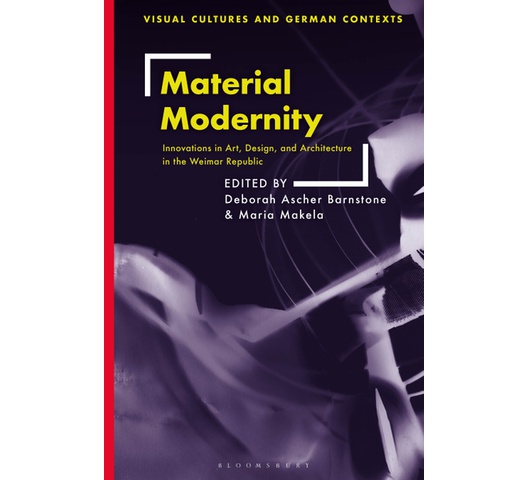
Material Modernity
by Deborah Ascher Barnstone, Maria Makela
This is an eBook that you can download electronically.
Material Modernity explores creative innovation in German art, design, and architecture during the Weimar Republic, charting both the rise of new media and the re-fashioning of old media. Weimar became famous for the explosion of creative ingenuity across the arts in Germany, due to experiments with new techniques (including the move towards abstraction in painting and sculpture) and inventive work in such new media as paper and plastic, which utilized both new and old methods of art production. Individual chapters in this book consider inventions such as the camera and materials like celluloid, examine the role of new materials including concrete composites in opening up fresh avenues in the plastic arts, and relate advances in the understanding of color perception and psychology to an increased interest in visual perception and the latent potential of color as both architectural ornament and carrier of emotional force in space.
While art historians usually argue that experimentation in the Weimar Republic was the result of an intentional rejection of traditional modes of expression in the conscious attempt to invent a modern art and architecture unshackled from historic media and methods, this volume shows that the drivers for innovation were often far more complex and nuanced. It first of all describes how the material shortages precipitated by the First World War, along with the devastation to industrial infrastructure and disruption of historic trade routes, affected art, as did a spirit of experimentation that permeated interwar German culture. It then analyzes new challenges in the 1920s to artistic conventions in traditional art modes like painting, sculpture, drawing, architecture, textiles, and print-making and simultaneously probes the likely causes of innovative new methods of artistic production that appeared, such as photomontage, assemblage, mechanical art, and multi-media art. In doing so, Material Modernity fills a significant gap in Weimar scholarship and art history literature.
SKU: 9781350228764
Format: EPUB
While art historians usually argue that experimentation in the Weimar Republic was the result of an intentional rejection of traditional modes of expression in the conscious attempt to invent a modern art and architecture unshackled from historic media and methods, this volume shows that the drivers for innovation were often far more complex and nuanced. It first of all describes how the material shortages precipitated by the First World War, along with the devastation to industrial infrastructure and disruption of historic trade routes, affected art, as did a spirit of experimentation that permeated interwar German culture. It then analyzes new challenges in the 1920s to artistic conventions in traditional art modes like painting, sculpture, drawing, architecture, textiles, and print-making and simultaneously probes the likely causes of innovative new methods of artistic production that appeared, such as photomontage, assemblage, mechanical art, and multi-media art. In doing so, Material Modernity fills a significant gap in Weimar scholarship and art history literature.
KES 5,389

International delivery
Free click & collect
When you buy an ebook from TBC, you will be given a code to download your
purchase from our ebook partner Snapplify. After you have redeemed the code and
associated it with a Snapplify account, you'll need to download the Snapplify Reader
to read your ebooks. The free Snapplify Reader app works across iOS, Android,
Chrome OS, Windows and macOS; on tablets and mobile devices, as well as on
desktop PCs and Apple Macs.
You're currently browsing Text Book Centre's digital books site. To browse our range of physical books as well as a wide selection of stationery, art supplies, electronics and more, visit our main site at textbookcentre.com!
Reviews
This product does not have any reviews yet.
Add your review
